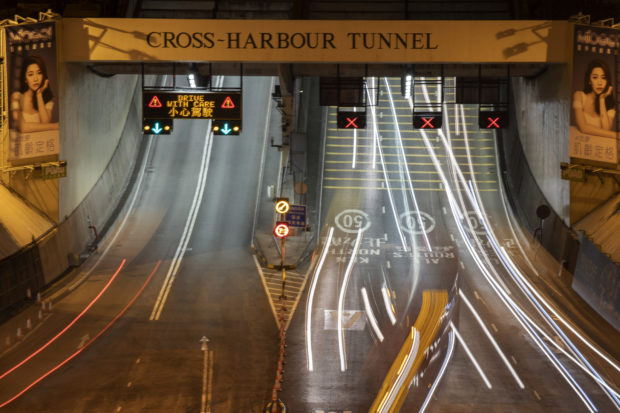HONG KONG – A major tunnel in Hong Kong reopened Wednesday morning and a weeklong police siege of a nearby university appeared to be winding down, closing one of the more violent chapters in the city’s long-running anti-government protests.

Traffic flows through the Cross-Harbor Tunnel which reopens in Hong Kong on Wednesday, Nov. 27, 2019. Closed by protesters who took over the neighboring Hong Kong Polytechnic University, the tunnel reopens after authorities repaired the damages caused. (AP Photo/Ng Han Guan)
The Cross-Harbour Tunnel, which links Hong Kong Island to the rest of the city, had been closed for two weeks after protesters blocked the approach with tons of debris and set the toll booths on fire.
A search of the Hong Kong Polytechnic campus the previous day found just one woman, in weak condition, and a senior university official said it’s unlikely anyone else remains.
A few people might still be hiding in the warren of buildings on the urban campus, trying to avoid arrest. The search apparently didn’t find a man who told reporters before dawn Tuesday that he is happy living at the university and “everyone can stop worrying about us.”
Police have cordoned off the area to try to prevent anyone from escaping.
Polytechnic University Vice President Alexander Wai, who led a search of the campus by seven teams, said he couldn’t rule out that some people remained, but “the possibility is not very high.”
Attention in Hong Kong has shifted to city leader Carrie Lam’s response to a major loss in local elections Sunday. The results were seen as a public rebuke of her tough line on the protests.
Lam, after issuing only a written statement Monday, offered no concessions to anti-government protesters, saying only that she would accelerate dialogue and identify ways to address societal grievances.
She said the central government in Beijing did not blame her for the election setback, and that while it may have reflected unhappiness with the government’s handling of the unrest, it also showed that many people want an end to the violence.
“Let me just stress that after these five-six months, Hong Kong people have realized very clearly that Hong Kong could no longer tolerate this chaotic situation,” Lam told reporters after a weekly meeting with advisers. “Please help us to maintain the relative calm and peace that we have seen in the last week or so and provide a good basis for Hong Kong to move forward.”
Her refusal to compromise could spark more unrest at a time when the semi-autonomous Chinese territory has plunged into its first recession in a decade.
The streets around Polytechnic were the scenes of fierce clashes with police 10 days ago. Protesters used the campus as a base and shut down access to a major roadway under Hong Kong’s harbor, setting the toll booths on fire.
The Cross-Harbour Tunnel will reopen Wednesday morning, earlier than expected, a senior city official announced.
The seven search teams went through most of the buildings on the Polytechnic campus, finding one woman who appeared physically weak, a university statement said.
Wai, the vice president, said she is over 18 and not a student of the university. A Red Cross first aid team gave her medical care, and counselors were trying to coax her to surrender.
Holdouts at the university had been trying to avoid arrest.
The search teams found gasoline bombs and other dangerous items, the Polytechnic statement said. The library was flooded, and the fuel tanks of cars had been forced open.
The university plans to resume the search in the morning, possibly with more people.
The pro-democracy bloc won control of 17 out of 18 district councils in Sunday’s election, which was seen as a barometer of public support for more than five months of pro-democracy protests.
Lam said that when she withdrew an extradition bill in September that had sparked the protests, she also gave a detailed response to the protesters’ other demands, including free elections for the city’s leader and legislature and a probe into accusations of police brutality.
The government hopes to take advantage of the current lull in violence to accelerate public dialogue and set up an independent review committee to find solutions to deep-seated societal issues, she said.
“The next step to go forward is really, as you have put it, to engage the people. And we have started public dialogue with the community,” Lam said.
“But unfortunately, with the unstable environment and a chaotic situation, I could not do more on that sort of engagement. I hope that the environment will allow me to do it now.”

